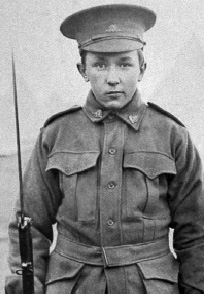Alec Campbell
Alec William Campbell, a veteran of Gallipoli, died on May 16th 2002, aged 103
In the first world war 324,000 Australians volunteered to fight overseas, an extraordinary number in a nation of fewer than 5m people. Of the 60,000 Australians who died in the war, 8,700 were lost in a few months during a hopeless attempt to capture Gallipoli, a small piece of territory in Turkey. In the words of a piece of doggerel at the time, “In five minutes flat, we were blown to hell / Nearly blew us right back to Australia.”
The story of Gallipoli and the Anzacs, the name given to members of the Australia New Zealand Army Corps, became a legend in Australia (and indeed in New Zealand, which lost 2,700 men). Nine Australians were awarded the Victoria Cross, Britain’s highest military honour. Australians talk of the Anzac spirit, rather as the British of a certain age talk of the Dunkirk spirit (both refer to managed retreats that softened the sting of defeat). A lot of Australian homes are simply called Anzac. Each year the battle is commemorated on April 25th, the anniversary of the Anzacs’ landing in Gallipoli in 1915, in what is now known as Anzac Cove.
This year, as on many previous occasions, the main commemorative procession was led by Alec Campbell, who because of his age was allowed the comfort of riding in a car. When Mr Campbell died a few weeks later flags were flown at half mast throughout Australia. He was given a state funeral on May 24th and the prime minister, John Howard, cut short an official visit to China to be there.
Mr Campbell was uneasy at his growing fame as one by one newspapers reported the deaths of the few remaining Gallipoli survivors. One of the last was Roy Longmore, who died last year aged 107. The last survivor on the Turkish side, Adil Sahin, died in 1998. When it seemed likely that Mr Campbell was the only remaining witness of Gallipoli he was increasingly referred to in Australia as a “national treasure”.
Alec Campbell was not so sure about that. He said, correctly, that he was an ordinary chap, but he politely answered reporters’ questions about his life. He was born into a farming family in Tasmania. Queen Victoria was still reigning. Australia had not yet seen a motor car. He worked on a cattle station, then as a carpenter, then as a civil servant. He gained an economics degree in his 50s, studying part-time. He taught himself to sail and took part in several big races in Australian waters. He was married twice and fathered nine children. It was a respectable life, although perhaps not an extraordinary one. Now, Mr Campbell, what about Gallipoli …?
The decision to land in Turkey was a consequence of the lack of success by Britain and its allies on the western front in France. Turkey, which had sided with Germany only reluctantly, was reckoned to be a soft target. Land forces, aided by the navy, would advance to Constantinople, and Turkey would surrender. The way would be open to supply Russia with much needed arms through the Dardanelles, the strip of water that separates Europe and Asia, and the Russians would march triumphantly to Berlin. What would now be called a multinational force of some 500,000 men was assembled from the far reaches of the British empire; and a disparate bunch they were, among them the Assyrian Jewish Refugee Mule Corps, believed to be the first Jewish unit to fight since 70AD, when the Romans attacked Jerusalem.
The Turks defended their territory well, killing 33,000 of the invasion force. The Anzacs were given a particularly tricky stretch of Gallipoli to attack. The beach where they landed was dominated by well-fortified high ground. The Anzacs lost 2,000 men on the first day. Alec Campbell arrived at Gallipoli some time after the initial attack, when the Anzacs were barely holding on. He was only 16, was still not shaving, but insisted he was 18.
Older Aussies called him the Kid, and did their best to protect him He was given the job of running water to the men in the front line. That was dangerous enough. Every day runners would be picked off by Turkish snipers. “They kept you on your toes,” he said. “To stick up your noddle was nearly always fatal.” Mr Campbell’s tour of duty ended after two months when he fell ill with a fever and was invalided home. He was asked how many Turks he had killed. “None,” he replied, probably truthfully. But in later life, fed up with the question, he said “Dozens.”
A British government report conceded that the attack on Turkey had been “ill conceived”. In Australia the criticism was earthier, and if anything the bitterness that followed the massacre of its young men has grown over the years. If Australia ever decides to become a republic, the memory of Gallipoli may play a part. Mr Campbell voted for a republic in the referendum in 1999. But he was not by nature a propagandist. If he spoke of the folly of

war, of the need for peace, of the idiocy of politicians, they were the casual views of an ordinary man. He was admired partly because he was so ordinary, an accidental hero.
Alec Campbell made a return visit to Gallipoli in later life and found a trench used by the Anzacs, now overgrown by wild flowers. He said, “It was a lovely place, you know, if conditions had been better …”